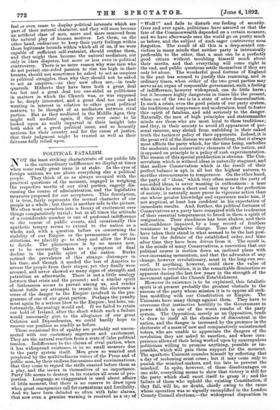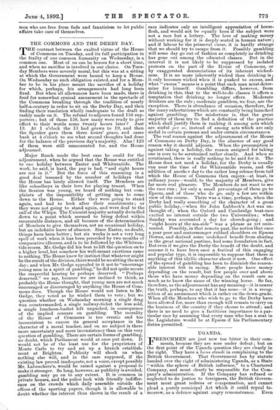POLITICAL FATALISM. N OT the least striking characteristic of our public
life is the extraordinary indifference we display at times when some really great issue is at stake. In the eyes of foreign nations, we are above everything else a political people. They think of us as always occupied with the practical questions of the moment, engaged in weighing the respective merits of our rival parties, eagerly dis- cussing the course of administration, and the legislative measures proposed for our acceptance. This description, it is true, fairly represents the normal character of our people as a whole ; but there is another side to the picture. We often work ourselves into a frenzy of excitement over things comparatively trivial ; but at all times the attitude of a considerable number is one of profound indifference to the course of public events, and occasionally this apathetic temper seems to extend to the nation as a whole, and, with a question before us concerning the stability of our Empire or the permanence of our in- stitutions, we placidly go to sleep and allow the Fates to decide. The phenomenon is by no means new, or to be necessarily taken as a symptom of final decline in the public spirit of the nation. Burke noticed the prevalence of this strange distemper in his time, and though it needed the loss of America to arouse the people from their stupor, yet they finally were aroused, and never showed so many signs of strength and patriotism as afterwards. There is not a little analogy between that crisis and the present ; and a similar spirit of listlessness seems to prevail among us, and render almost futile any attempts to create in the electorate a sense of the danger to the Empire involved in the pro- gramme of one of our great parties. Perhaps the penalty must again be a serious blow to the Empire ; but here, un- fortunately, the analogy would end. If we failed to retain our hold of Ireland, after the shock which such a failure would necessarily give to the allegiance of our great Colonies and Dependencies, we could hardly hope to recover our position so readily as before. These occasional fits of apathy are probably not uncon- nected with our customary eagerness and excitement. They are the natural reaction from a state of false political tension. Indifference to the claims of rival parties, when it has widespread existence, is in no small measure due to the party system itself. Men grow so wearied and perplexed by the multitudinous voices of the Press and of public men, by their endless discussions and recriminations, that they come to regard the strife enacted before them as a play, and the issues in themselves of no importance. Party life seems to destroy in its votaries all sense of pro- portion. Language so exaggerated is used. about affairs of little moment, that there is no reserve to draw upon when great emergencies call for earnestness and forcibility. And, we have been deluded so often with false alarms, that now even a genuine warning is received as a cry of " Wolf !" and fails to disturb our feeling of security. Over and over again, politicians have assured us that the fate of the Commonwealth depended on a certain measure, and we have afterwards seen the world go on pretty much as before, and the subject of such eager controversy soon forgotten. The result of all this is a deep-seated con- viction in many minds that neither party is intrinsically preferable to the other, that a man can be a perfectly good citizen without troubling himself much about their merits, and that everything will come right in the end, and public questions settle themselves if they are only let alone. The wonderful good fortune of England in the past has seemed to justify this reasoning, and in ordinary times, when either of the two great parties may serve as an organ of responsible government, such a feeling of indifference, however widespread, can do little harm ; but it becomes highly dangerous in times like the present, when one of the two is in a state of utter demoralisation. In such a crisis, even the good points of our party system, the traditions of temperance and moderation, tend to foster this spirit of fatalism, and add seriously to the danger. Naturally, the men of high principles and statesmanlike minds are those who are most loyal to these traditions ; and they, in their anxiety to avoid all appearance of per- sonal rancour, may shrink from unfolding in their naked truth the tactics or policy of their opponents. Indeed, it is the great evil of the disease we are describing, that it always most afflicts the party which, for the time being, embodies the moderate and conservative elements of the nation, and is opposed on principle to a policy of rash experimentation. The reason of this special predilection is obvious. The Con- servatism which is without ideas is naturally stagnant, and that mellow Conservatism which is the result of their perfect balance is apt, in all but the highest natures, to sacrifice strenuousness to temperance. On the other hand, the party of "ideas," which very often means the party of one-sided ideas, is never wanting in enthusiasm : a man who thinks he sees a short and easy way to the perfection of society, is naturally more prone to vigorous action than one whose greater knowledge and experience make him, if not sceptical, at least less confident in his expectation of immediate results. And, further, the political fortunes of Conservatives as a party have conspired with the tendencies of their essential temperament to breed in them a spirit of resignation. Their steadiness has been shaken, and their self-confidence impaired, by a long record of fruitless resistance to legislative change. Time after time they have taken their stand in what seemed to be the last posi- tion for the defence of the established order, and time after time they have been driven from it. The result is, in the minds of many Conservatives, a conviction that our political course is motion down an inclined plane with ever-increasing momentum, and that the advocates of any change, however revolutionary, must in the long-run suc- ceed. If anything, however, could show the value of resistance to revolution, it is the remarkable diminution so apparent during the last few years in the strength of the movement against the Church Establishment.
However its existence is to be explained, this fatalistic spirit is at present probably the greatest obstacle to the success of the party whose mission it is to oppose all reck- less meddling with our Constitution or Empire. The Unionists have many things against them. They have to overcome that instinctive hostility to the Government in power which is one of the worst results of the party system. The Opposition, merely as an Opposition, tends to draw to itself all the elements of discontent in the nation, and the danger is increased by the presence in the electorate of a mass of new and comparatively uninstructed voters, who are unable to appreciate the dangers of the revolution they are asked to sanction, and whose inex- perience allows of their being worked upon by unscrupulous politicians willing to promise anything, possible or im- possible, which will gain them support for the moment. The apathetic Unionist consoles himself by reflecting that a day of reckoning must come; but it may come only to punish the mischief-makers, and too late to prevent the mischief. In spite, however, of these disadvantages on one side, everything seems to show that victory is still for the party which shall exert itself to grasp it ; and the failure of those who uphold the existing Constitution, if they fail, will be, no doubt, chiefly owing to the cause whose operation was so signally exemplified in the London County Council elections,—the widespread disposition in men who are free from fads and fanaticism to let public affairs take care of themselves.



































 Previous page
Previous page